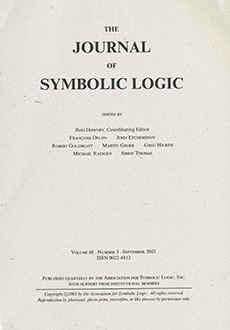Abstract
The splitting theorem says that any set of formulae has a finest representation as a family of letter-disjoint sets. Parikh formulated this for classical propositional logic, proved it in the finite case, used it to formulate a criterion for relevance in belief change, and showed that AGM partial meet revision can fail the criterion. In this paper we make three further contributions. We begin by establishing a new version of the well-known interpolation theorem, which we call parallel interpolation, use it to prove the splitting theorem in the infinite case, and show how AGM belief change operations may be modified, if desired, so as to ensure satisfaction of Parikh’s relevance criterion.
Citation
George Kourousias. David Makinson. "Parallel interpolation, splitting, and relevance in belief change." J. Symbolic Logic 72 (3) 994 - 1002, September 2007. https://doi.org/10.2178/jsl/1191333851
Information





